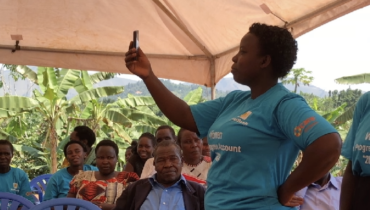Originally published here.
“I make kenkey [maize dough] for a living,” explains Rita, the animated young woman standing before me. “I used to buy just five bowls of maize flour at a time. After learning about the importance of customer relations, I’ve become more polite to those who visit my shop. I always thank them for their business, and I provide a little extra kenkey as a bonus if they buy large quantities. As a result, customers have become loyal to me. I’m now able to buy my maize by the bag [approximately 40 bowls], and all my kenkey sells out by the end of the day!”
Listening to Rita recount the story of her business’s growth, I scribble furiously on my notepad. As we chat, I strain to juggle my notes and camera and to establish genuine rapport with Rita and the hundreds of trainees like her that I went on to meet across northern Ghana this summer.
Seeking to broaden my horizons beyond my previous non-profit and intergovernmental work, I accepted a summer internship with the Coca-Cola’s Equatorial Africa office in Ghana. While familiarizing myself with corporate office culture (with a Ghanaian twist!), I helped to roll out Coca-Cola’s worldwide 5by20 program.
5by20 aims to enable the economic empowerment of 5 million women entrepreneurs across the company’s global value chain by 2020. Eschewing traditional CSR strategies, Coca-Cola has embraced what it calls a sustainability approach. This approach holds that if the communities and small businesses in which Coca-Cola operates succeed, Coke, too, will succeed. Coca-Cola executives I met with explained that while CSR agendas often shift with the whims of a firm’s leadership, sustainability programs that support a company’s bottom line alongsideits social goals are harder for skeptical new CEOs to push aside.
The Ghana team has just begun to roll out 5by20, and I spent the summer assessing their pilot programs in northern Ghana. 5by20 programs are adapted depending on local needs. In Ghana, the trainings focus on equipping small business owners with customer relations and business planning skills, providing networking opportunities, and arranging microloans to provide seed capital for growth.
Rita and the other women I met own a wide range of businesses: vegetable kiosks, bakeries, tailoring shops, beauty salons, trading enterprises, production of Ghanaian staples like groundnut (peanut) paste and kenkey, and yes, Coca-Cola vendors. While many of these enterprises are not directly related to Coca-Cola’s value chain, Coca-Cola believes these entrepreneurs’ success can directly impact the economic growth of the communities in which the company operates. This not only expands consumer buying power, but also improves living standards and education levels.
This summer opened my eyes to the potential of sustainability programs to generate shared value for both companies and communities. Research recently quoted in The Economist claims Coca-Cola’s brand is worth more than its other assets; this brand awareness was evident in even the most remote communities we visited. In contrast to the “Sorry, what does that stand for?” response familiar to anyone who has represented a typical acronym-clad development agency, I was received with immediate recognition and open arms in each of the several dozen Ghanaian communities we visited.
This was a pleasant surprise, given the distrust of large corporations I’ve become accustomed to among many development professionals. In fact, several women noted that it is precisely Coca-Cola’s long-term presence in their communities that gives them faith the company will follow through with later program components, faith that has too often been broken by less scrupulous (or perhaps, simply less financially-sound) institutions.
Observing how closely participants connected their 5by20 experiences and feedback on the program to their willingness to consume or sell Coca-Cola products gave me renewed faith in the potential of corporate sustainability. When designed with community input and implemented cooperatively, sustainability programs can not only achieve measurable community impacts, but also strengthen brand recognition and loyalty. No longer just about photo ops and success stories, today’s sustainability programs highlight how deep Coca-Cola and other companies’ incentives are to “do it right” in their community development efforts.


